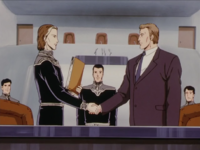Job Trunicht
From Gineipaedia, the Legend of Galactic Heroes wiki
 Supreme Chairman Trunicht (798 UC (489 IC / 3598 CE)) | |
| Gender: | Male |
| Affiliation: | Galactic Empire Terraist Church (secret) Free Planets Alliance (former) |
| Occupation: | Secretary of Defence Supreme Chairman Neue Land Senior Council Official |
| Status: | Deceased (murder) |
| Died: | 800 UC (2 NIC / 491 IC / 3600 CE) |
| Played by: | Ishizuka Unshō (deceased) |
Job Trunicht (Japanese: ヨブ・トリューニヒト) was an Alliance politician and its penultimate head of state, leading what was widely perceived as an incompetent and corrupt administration, a symbol of the decline of Arle Heinessen's legacy. Though democratically elected, Job Trunicht used fear to maintain his power—fear of the Galactic Empire, and fear of his own secret police, the murderous Patriotic Knights Corps. He was simply out for his own personal power and survival, becoming involved in factional politics and not caring for the future of the Alliance, despite outwardly preaching the opposite. Trunicht's corruption was seen as one of the contributing factors to the fall of the Alliance and democracy to Reinhard von Lohengramm. After the defeat of the Alliance in Operation Ragnarök he took responsibility for the defeat and resigned, having surrendered the Alliance because his life was threatened by the Imperial Fleet. Following the complete subjugation of the Alliance during the Second Alliance–Imperial War, Trunicht made dealings with both the Church of Terra and the New Galactic Empire, ultimately betraying all of the factions that he once claimed loyalty to.
Trunicht was later shot by Oskar von Reuenthal shortly before the latter's own death, after having insulted Kaiser Reinhard in their conversation.
Contents |
Early career
Little is known of his background other than that he was said to have served in the Alliance Star Fleet as an enlisted man, though during his service he did not set foot off of Heinessen. The fact that he was not sent to the front lines was later omitted from the public record, but it was quite a common story for Alliance politicians and their families. Regardless, by 788 UC (479 IC / 3588 CE) Job Trunicht, a newly elected member of the National Defence Committee, was known as a "rising star" of Alliance politics. In 9 October 788 UC (479 IC / 3588 CE) he made a show of attending the private funeral of former Alliance hero and last surviving member of the Year 730 Mafia, Alfred Rosas. (Overture to a New War, SL: 'Between the Mourning Dress and Military Uniform')
At some point Trunicht had become involved with the ultranationalist group known as the Patriotic Knight Corps (PKC), as they would later be answering to him and serving as his administration's black shirts. (Overture to a New War; LOGH: 'Jessica's Struggle')
Secretary of defence

Before the coup d'etat, Trunicht sat as the elected Secretary of Defence on the High Council as part of the Sanford Administration. When he asked Yang Wen-li what is the best strategy to win a war, Yang simply responded that a war must be won before being fought, and that six times the manpower of the enemy was enough to make up for deficiencies in any tactics. This upset Trunicht, because his own reasons for warfare served his personal gain rather than defeat of the Empire. In retaliation, he requested that Yang Wen-li be sent in the 2nd Fleet to engage Imperial Admiral Reinhard von Lohengramm. To add insult to injury, he only authorized a force twice the size of the Imperial fleet, rather than six times. Upon the conclusion of Astarte, he spun the defeat as victory for the reason the Alliance fleet survived at all. He later extolled the dead Alliance personnel and gave a speech lionizing their sacrifice. During the speech he was confronted by anti-war activist Jessica Edwards, who criticized him for not serving on the front lines himself while telling others to do so. Later Trunicht berated the leader of the PKC for having caused to much commotion in their attack on Yang Wen-li's home when he had assisted Jessica Edwards, and told them to stand down after Yang visited Trunicht's mansion and asked him to stop them from targeting Edwards. (Overture to a New War)
After the fall of Iserlohn Fortress to the Alliance at the Seventh Battle of Iserlohn in the spring of 796 UC (487 IC / 3596 CE), Trunicht congratulated Yang Wen-li for the success and had him assigned as the commander of Iserlohn. Weeks later, with the Iserlohn Corridor under Alliance control, he argued in favor for an invasion of the Galactic Empire at the High Council when it was proposed by some ambitious young officers, despite knowing that it would fail, but ultimately voted against the proposal after having argued in favor of it. Trunicht was using it as a way of gaining more power for himself: he would be praised for having the foresight to know that the invasion would not succeed, being the most influential of the three councilors that voted against it (the other two being finance secretary João Rebelo and human resources secretary Huang Rui). (LOGH: 'Iserlohn Captured!', 'Invasion of the Imperial Territory')
When the invasion inevitably did end disastrously with the deaths of over twenty million Alliance soldiers in the autumn of 796 UC (487 IC / 3596 CE), the Sanford Administration fell, as he had expected, with Trunicht replacing Sanford as the interim supreme chairman of the High Council. (LOGH: 'New Trends')
Civil war
The destruction of the bulk of the Alliance Star Fleet's strength during the invasion, combined with economic and social problems at home, caused disillusionment among the public with the government in general. Reinhard von Lohengramm, having become the Supreme Commander of the Imperial Fleet, decided to take advantage of the situation while he was preparing for his own armed confrontation with the Imperial nobility and sent a disgraced Alliance rear admiral, Arthur Lynch, to stir up the discontented elements within the Free Planets Star Fleet. The Trunicht administration agreed to a humanitarian POW exchange of some two million prisoners in January 797 UC (488 IC / 3597 CE) with the government of Klaus von Lichtenlade in the Empire (presumably to gain their votes and to appear more humanitarian), which was a ruse used by Lohengramm to get Lynch smuggled into the Alliance. Although Yang Wen-li deduced Reinhard's plan, Trunicht did not. (LOGH: 'New Trends', 'Before the Storm')
However, when a coup d'etat did occur on Heinessen against the Alliance government in the spring of 797 UC (488 IC / 3597 CE), Supreme Chairman Trunicht went into hiding, aided by members of the Terraist Church. His exact dealings with the Terraists are unknown, but he later implied that he was using them just as they were trying to use him. Job Trunicht thus managed to evade being detained by the National Salvation Military Council (NSMC) during their coup, waiting them out as Admiral Yang fought and defeated the putchists. The entire time, one of Trunicht's loyalists, Captain Veigh, kept the head of state informed of the decisions being made by the NSMC by pretending to be a coup supporter. When Yang liberated Heinessen in late 797 UC (488 IC / 3597 CE), Trunicht emerged from hiding to retake his power. (LOGH: 'The Yang Fleet Goes Out', 'Victory for Whose Sake?')
Fall of the Alliance
- "While they extol democracy, in reality, by ignoring laws and rules, they reduce it to a mere formality. It is a cunning but risky way of doing things. Because if the people in power do not respect their own laws, the standards of society itself slacken."
- —Adrian Rubinsky on the Trunicht Administration

As noted by Fezzani Landesherr Adrian Rubinsky in January 798 UC (489 IC / 3598 CE), the Alliance Civil War weakened its country, while the Empire was strengthened by its Imperial Civil War. Thus, unbeknownst to Trunicht, Rubinsky planned to use Fezzan's wealth to support Reinhard von Lohengramm, who emerged as the de facto dictator of the Empire, and allow him to conquer the Alliance. As part of this the Fezzanis tried to get Admiral Yang summoned to the capital away from Iserlohn so that the Imperial Fleet could take control of it. Rubinsky's secretary Rupert Kesserling implied to Alliance ambassador on Fezzan, Henslow, that Fezzan was worried that Yang might try to overthrow the Trunicht Administration and implement a military dictatorship. He also said that because of this the Fezzani government was worried about granting the Alliance further loans. Henslow reported this information to Heinessen, where Trunicht—incapable of seeing beyond petty factional politics—took this imagined threat from Yang to his power seriously, exactly as the Fezzanis intended. (LOGH: 'One Narrow Thread')
On Iserlohn, Rear Admiral Alex Cazerne, head of logistics, told Yang that he was worried about Trunicht, particularly about his ability to survive political scandals like the civil war and the failed invasion, noting that Yang would only be useful to him as long as the Empire continued to threaten the Alliance. Nonetheless Cazerne believed that Trunicht, who had 'made a deal with the devil', considered Yang an enemy. In March 798 UC (489 IC / 3598 CE), Cazerne's fears proved to be correct when the Alliance head of state had his defence secretary, Negroponte, summon Yang to the capital for an inquiry into his actions during the previous year's civil war. (LOGH: 'One Narrow Thread', 'Lost Things')
Meanwhile, in the aftermath of the Alliance civil war Trunicht used his authority to further take control of the Free Planets Star Fleet, putting his loyalists into positions of power in the military's joint operations headquarters. The coup attempt by the NSMC had weakened the fleet's ability to confront the government and discredited it in the eyes of the public, allowing the head of state to bring his factional politics and nepotism into its ranks as well. The mass media remained under his government's influence and practiced selective reporting. Furthermore the problems with government corruption, the economy, and social tensions continued unabated. The Free Planets Alliance under Trunicht gradually began ignoring the ideals of democracy, human rights, and civil liberties that Arle Heinessen and his followers had envisioned when they formed it. Yang Wen-li and his allies, as well as Rubinsky and Kesserling on Fezzan, noted the contrast between the corrupt and incompetent Trunicht Administration in the Alliance, and the seemingly more just government of Reinhard von Lohengramm, which had been implementing extensive reforms in the Empire to sweep away the ancien régime of the Goldenbaums following the defeat of the Imperial high nobility. Yang glumly noted that it seemed to much more 'for the people' than the present Alliance administration. (LOGH: 'The Inquiry Committee', 'War Without Weapons')
The inquiry dragged on for days without reaching any sort of conclusion until news arrived on the Alliance capital that Geiersburg Fortress, mobilized using warp engines, had entered the Iserlohn Corridor and engaged the Alliance defenders there while Yang was gone. Thus Trunicht ordered the committee to be disbanded immediately and shamelessly gave Yang orders to go fight off the Imperial invaders (through defence secretary Negroponte). The head of state then pressured Negroponte to take responsibility for this incident of having the Iserlohn commander summoned away from his post when the Empire attacked, rather than Trunicht himself, and resign—which he did. Trunicht subsequently replaced him as defence secretary with Walter Islands, who had bribed the head of state to obtain a cabinet position. The young admiral, meanwhile, returned to the fortress and was able to destroy Geiersburg, ending the threat of imminent Imperial invasion. (LOGH: 'War Without Weapons', 'Fortress vs Fortress', 'Determination and Ambition')

With Geiersburg destroyed, the Alliance was saved again from Imperial invasion, albeit temporarily, as Trunicht decided to go along with another Fezzani scheme. The exact dealings behind the scenes are unknown, but Rubinsky was able to persuade Trunicht and his government to take in the abducted child emperor Erwin Josef II, kidnapped by some high nobles and anti-Reinhard faction veterans of the Imperial Civil War. In August of 798 UC (489 IC / 3598 CE), Trunicht together with former Imperial ambassador to Fezzan, Jochen von Remscheid, announced the formation of a "legitimate" Imperial government-in-exile and the Alliance's support for its effort in overthrowing Reinhard von Lohengramm, who Trunicht claimed represented the biggest threat to the Alliance. Its intended goal was to restore the power of the Goldenbaum Dynasty and the old nobility that Reinhard had revoked the privileges of. The fact that Trunicht was willing to collaborate with the Alliance's former enemies, that represented everything that Arle Heinessen and the Free Planets Alliance itself had opposed, in order to restore the traditional ancien régime over the Imperial people, was seen by Yang and many others as yet another sign of the corruption and decay of the Alliance. Reinhard von Lohengramm responded and essentially declared war on the Alliance for abetting the kidnappers of the emperor. (LOGH: 'The Abduction of the Young Emperor', 'The Arrow Is Released')
Even as another Imperial invasion was imminent, Trunicht engaged in his power politics by assigning members of Yang's staff on Iserlohn to other posts, including his adopted son Julian Mintz—personally appointed by the head of state as a military attaché on Fezzan. Although Admiral Yang had foreseen the Empire's plan to invade the Alliance by using the Fezzan Corridor instead of Iserlohn, such claims are ignored by the Trunicht Administration and thus the Alliance was completely unprepared for Reinhard's Operation Ragnarök. It was not until the Imperial annexation of the Dominion of Fezzan in December 798 UC (489 IC / 3598 CE) that the Alliance government realized what was happening. In the spring of 799 UC (1 NIC / 490 IC / 3599 CE), when the Battle of Vermillion was raging, Trunicht surrendered the Alliance when admirals Wolfgang Mittermeyer and Oskar von Reuenthal arrived at the defenseless Heinessen. Rather than resist he decided to surrender to save himself, giving Yang Wen-li an order to stand down as well, despite that Yang came close to actually defeating Reinhard von Lohengramm. Yang, a believer in civilian control over the military, obeyed the order despite protests from his subordinates. (LOGH: 'A Departure', 'Operation: Ragnarök', 'Fezzan Occupied', 'The Cold Spell Arrives', 'Sudden Change')
Defection and final months

Trunicht's life was spared following the Alliance's surrender to the Galactic Empire thanks to Yang Wen-li's direct plea to Reinhard von Lohengramm to not prosecute any high ranking Alliance officials. Trunicht took responsibility for the defeat to the Empire and resigned as Supreme Council Chairman after signing the Treaty of Ba'alat on behalf of his country on 25 May 799 UC (1 NIC / 490 IC / 3599 CE), which essentially transformed the Free Planets Alliance into an Imperial client state and ended the Alliance–Imperial War. Trunicht, in turn, appealed directly to Reinhard hoping to be given a position of authority. Reinhard was disgusted by Trunicht, refusing to meet with him directly, and granted him a small estate on an out-of-the-way Imperial frontier world. Meanwhile in the Alliance, João Rebelo—a critic of the Truincht Administration—had replaced the man as head of state, determined to keep the Alliance independent against the yoke of Imperial subjugation. (LOGH: 'Sudden Change', 'Long Live the Emperor!')
About two months later, Trunicht approached Ulrich Kesler, head of the Imperial Military Police on Odin, with details of the Terraist's plot to assassinate Reinhard von Lohengramm via Baron Heinrich von Kümmel, a relative of his secretary whom he was visiting. Trunicht's information on the Terraists was vital to the Empire's quick response and subsequent retaliation on the Church's headquarters on Terra. While it is likely Trunicht hoped to trade that information for political or financial gain, it is unknown whether or not he received any reward for his help. He remained distrusted regardless, though he claimed that he had been forced to cooperate with the Terraists in the past because circumstances had forced him to. Despite this claim, in 800 UC (2 NIC / 491 IC / 3600 CE), after the Imperial annexation of the Alliance following the Second Alliance–Imperial War and Trunicht's return to his homeland as a council official in the Imperial military government, a friend of Yang Wen-li spotted Terraist officials entering Trunicht's house on Heinessen. (LOGH: 'The Kümmel Incident', 'New Government in August')
Death
Trunicht later met Oskar von Reuenthal shortly after the defeat of his rebellion. The two had a short conversation in which Reuenthal described him as a leech that fed off whatever system he happened to be in and Trunicht insulted Kaiser Reinhard, for which the Imperial admiral shot him. (LOGH: 'Endless Requiem')
After his death, it was discovered that Trunicht had claimed his true goal was to bring democratic constitutionalism to the New Galactic Empire, from a confession given by Dominique Saint-Pierré. Whether this was truly the case is unknown. (LOGH: 'Dream: To See It to the End')
Appendices
Appearances
- My Conquest Is the Sea of Stars (first appearance)
- LOGH:
- 'Birth of the 13th Fleet'
- 'The Rosen Ritter'
- 'Invasion of the Imperial Territory'
- 'Before the Storm'
- 'Victory for Whose Sake?'
- 'One Narrow Thread'
- 'The Inquiry Committee'
- 'War Without Weapons'
- 'The Arrow Is Released'
- 'A Departure'
- 'Sudden Change'
- 'Long Live the Emperor!'
- 'The Kümmel Incident'
- 'Rumbling'
- 'Endless Requiem' (death)
- Overture to a New War
- SL: 'Between the Mourning Dress and Military Uniform' (final appearance)
Name variations
- Job Trünicht (Novels)
- Job Truniht (LD subtitles)